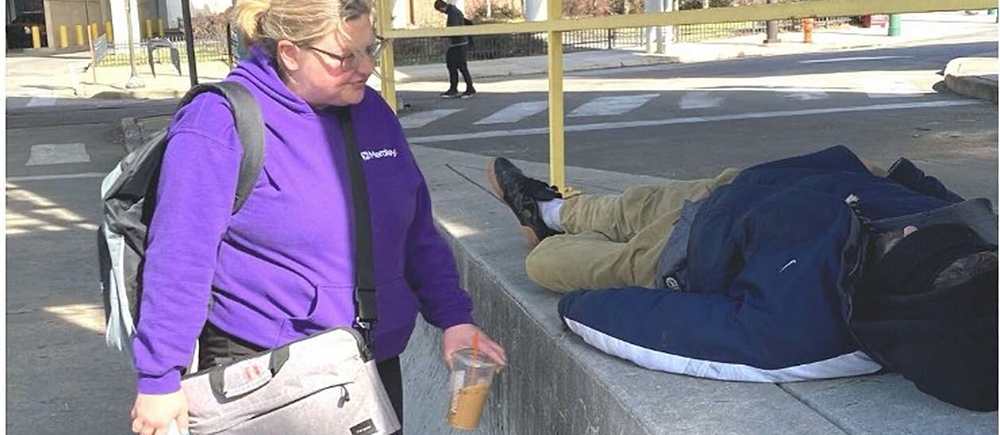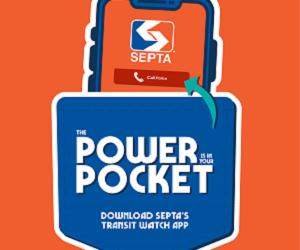
A Day in the Life of an Outreach Worker
March 2, 2023

No two days are exactly alike for the dozens of outreach workers that fan out across the SEPTA system each day - seeking to connect vulnerable individuals with social services.
Our SCOPE Team spoke with outreach worker Sarah Colton from Merakey, a nonprofit social services agency contracted by SEPTA to connect vulnerable individuals in and around the system with appropriate services, about her "typical" day.
First some background:
Sarah Colton is one of approximately thirty (30) outreach specialists working on the SEPTA system as part of the Authority's SCOPE program. SCOPE, which stands for safety, cleaning, ownership, partnership and engagement, is SEPTA's systemwide program addressing the challenges of the vulnerable population which includes individuals experiencing homelessness, substance abuse, and mental health issues. Besides Merakey - SEPTA has contracts with social services agencies Eagle Staffing and One Day at a Time. SCOPE has also partnered with Drexel Medical School, Cabrini University, the Philadelphia Center Against Sexual Violence (WOAR), Northeastern Treatment Center (NET), and Delaware Valley Victim Assistance Center, adding dozens more volunteer outreach workers. Together they are helping connect vulnerable individuals to vital services and making SEPTA safer for riders and employees.
Sarah's "Typical" Day:
It's cold and dark when Sarah Colton starts work, but she is busy right away - even at 6AM.
"We see a lot of people at that hour because that is when people must leave the shelters. And with a lack of warming centers in the city, many individuals experiencing homelessness flock to SEPTA because it's warmer underground than out on the street where it may be snowy or raining," explains Sarah. "That's why many vulnerable individuals end up at 69th Street, Frankford Transportation Center, and between 2nd and 15th Street Station underground."
These days Sarah sees more young people, ages 18 to 23, living on the streets. But not everyone on the streets is homeless. "People often drive down to Allegheny. Sometimes they take a bus to the Frankford Transportation Center and then take the El to get their stuff," she explains. "You can tell by their clothing that they haven't spent a week on the street. But they don't wait to get home to do the drug - and then the drug takes over."
On a typical day, Sarah begins work by doing wellness checks which can be as basic as making sure people are still breathing and coherent. Sometimes she and her fellow outreach workers perform wound care and hand out water bottles or a snack.
"We try to engage individuals and get their name, date of birth, and learn what their most pressing needs are. We let them know we just want to help and connect them with rehab, detox, or shelter," she says. "It helps people trust that we care. We want to be the support they need but they have to let us in. The person has to want help deep in their heart."
Sarah strives to do what's called a "warm hand-off." This involves physically accompanying a vulnerable individual from SEPTA to a shelter or health care agency like Prevention Point. It's reassuring to Sarah to know that an individual is getting the help they need. But sometimes the barriers to getting help - lack of transportation, no ID card to receive benefits, and addiction relapse - seem unsurmountable. Many are unwilling to go to a shelter - particularly men and couples who don't want to be split up. It can also take a dozen or more interactions with the same individual to build trust. "If they deny accepting services - we say as nicely as we can that you have to clear SEPTA property," says Sarah. "We don't physically remove anyone. Most of them know us and see outreach coming and they tell us they will move. They see us so much that they respect us."
Sometimes Sarah and her colleagues encounter individuals who have overdosed and aren't responding. "We don't want to administer Narcan unless we have to," says Sarah of the prescription medicine used to treat someone suspected of an opioid overdose. "That just puts them into withdrawal and it doesn't reverse xylazine - a veterinary tranquilizer used mainly on horses."
Sarah does her best to rouse the individual and encourage them to go to the hospital. Sometimes she must call the City of Philadelphia's medics. If the individual still refuses to go to the hospital, she must ask them to leave SEPTA property. In rare cases - she calls SEPTA Transit Police. "They see the uniform and they usually get up and leave SEPTA property," says Sarah.
On other occasions, SEPTA Transit Police calls Sarah. "Sometimes they have an individual who wants detox, rehab, or shelter. We always respond and take a dispatch call. Sometimes the person denies service - but we always respond."
Sarah's day ends at 2PM when another crew of outreach workers takes over. Now it's time for her to shift gears and pick up her 10-year-old son from school. Together, the two often make sandwiches for people experiencing homelessness. "He is taught to give back in service," she says. "Too many young kids are spitting at and kicking our vulnerable population, but these are human beings - someone's kid. I wish the world could see a little more of that."
Sarah understands how hard it is to accept help and move from substance abuse dependence to recovery. She also understands loss. While she has more than a decade in recovery, her fiance was not so fortunate and addiction claimed his life.
"When I talk to people on the streets, I really understand," she says. "I have my lived experience in addition to my education."
Early on during her recovery, Sarah studied behavioral health at a community college later transferring to La Salle University where she earned a bachelor's degree in social work. She could have chosen to work in a hospital or rehab facility but she wanted to go to the root of the problem. "It all starts out here on the streets," she says. "I like to walk people through the process of getting help. And I didn't want another individual to lose a son, a daughter, a spouse, or parent to addiction."
To those ready to accept help: Sarah's own success at recovery stands as a beacon of hope.
As an organization, SEPTA strives to find compassionate, long-term solutions for the vulnerable population. Our investment in SCOPE is critical to ensuring SEPTA can provide safe, secure, and reliable service that supports our city and region through the current recovery and for the long-term.
From January 16 to January 31, 2023 - SEPTA Outreach Teams recorded:
1,342 ENGAGEMENTS:
Each engagement represents an individual who was guided off SEPTA's system. The majority of these interactions do not require police assistance.
85 RESOURCE DISTRIBUTIONS:
Food, clothing, wound care, and transportation are resources distributed by SEPTA outreach teams.
308 REFERRALS:
Mental health treatment, drug and alcohol treatment, shelters, PAD office, and other social service providers are examples of places a vulnerable individual may be referred.
3 NARCAN DEPLOYMENTS:
Narcan is a treatment that reverses an opioid overdose.
16 WARM HAND-OFFS:
During a warm hand-off, outreach teams directly and physically connect a vulnerable individual with a social service provider.
65 CALLS TO POLICE DISPATCH:
Outreach teams reduce the number of contacts between police and vulnerable individuals.
We remind riders, stakeholders, and neighbors - if you see something, say something. The SEPTA Transit Watch App has incident-reporting features that allow SEPTA riders to discreetly share safety & security tips with SEPTA Transit Police in less than 20 seconds. And it's FREE to download on both the App Store and Google Play. SEPTA Transit Watch is not just for customers with smartphones. Those with old-style flip phones can use “Text A Tip,” which allows them to reach SEPTA Transit Police with a simple text message to (215) 234-1911. And it furthers the Authority’s commitment to accessibility. The app provides a new way for the deaf and hard of hearing community to communicate with SEPTA Police. Additionally, the app includes visually-impaired functionality.



